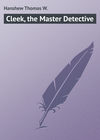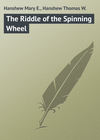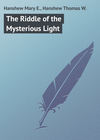Buch lesen: «Cleek, the Master Detective», Seite 13
III
If punctuality is a virtue, then Mr. Maurice Van Nant deserved to go on record as one of the most virtuous men in existence. For the little Dutch clock in Captain Morrison's drawing-room had barely begun to strike seven on the following Thursday evening when he put in an appearance there, and found the captain and his daughter anxiously awaiting him. But, as virtue is, on most excellent authority, its own reward, he had to be satisfied with the possession of it, since neither Narkom nor Cleek was there to meet him.
But the reason for this defection was made manifest when Miss Morrison placed before him a telegram which had arrived some ten minutes earlier and read as follows: "Unavoidably delayed. Be with you at nine-thirty. Ask Mr. Van Nant to wait. Great and welcome piece of news for him, Narkom."
Van Nant smiled.
"Great and welcome news," he repeated. "Then Mr. Headland must have found something in the nature of a clue in Ireland, captain, though what he could find there I can't imagine. Frankly, I thought him a stupid sort of fellow, but if he has managed to find a clue to poor George's whereabouts over in Ireland, he must be sharper than I believed. Well, we shall know about that at half-past nine, when Mr. Narkom comes. I hope nothing will happen to make him disappoint us again."
Nothing did. Promptly at the hour appointed the red limousine whizzed up to the door, and Mr. Narkom made his appearance. But, contrary to the expectations of the three occupants of the little drawing-room, he was quite alone.
"So sorry I couldn't come earlier," he said, as he came in, looking and acting like the bearer of great good news; "but you will appreciate the delay when I tell you what caused it. What's that, Mr. Van Nant? Headland? No, he's not with me. As a matter of fact, I've dispensed with his services in this particular case. Fancy, Miss Morrison, the muff came back from Ireland this evening, said the clairvoyante he consulted went into a trance, and told him that the key to the mystery could only be discovered in Germany, and he wanted me to sanction his going over there on no better evidence than that. Of course, I wouldn't; so I took him off the case forthwith, and set out to get another and a better man to handle it. That's what delayed me. And now, Mr. Van Nant" – fairly beaming, and rubbing his palms together delightedly – "here's where the great and welcome news I spoke of comes in. I remembered how your heart is wrapped up in the solving of this great puzzle and what you said about it being a question of money alone; and so, what do you think I did? I went to that great man, Cleek. I laid the matter before him, told him there was no reward, that it was just a matter of sheer humanity – the consciousness of doing his duty and helping another fellow in distress – and, throw up your hat and cheer, my dear fellow, for you've got your heart's desire: Cleek's consented to take the case!"
A little flurry of excitement greeted this announcement. Miss Morrison grabbed his hand and burst into tears of gratitude; the captain, forgetting in his delight the state of his injured foot, rose from his chair, only to remember suddenly and sit down again, his half-uttered cheer dying on his lips; and Van Nant, as if overcome by this unexpected boon, this granting of a wish he had never dared to hope would be fulfilled, could only clap both hands over his face and sob hysterically.
"Cleek!" he said, in a voice that shook with nervous catches and the emotion of a soul deeply stirred, "Cleek to take the case? The great, the amazing, the undeceivable Cleek! Oh, Mr. Narkom, can this be true?"
"As true as that you are standing here this minute, my dear sir. Not so much of a money grabber as that muff Headland wanted you to believe, is he – eh? Waived every hope of a reward, and took the case on the spot. He'll get at the root of it, Lord, yes! Lay you a sovereign to a sixpence, Mr. Van Nant, he gets to the bottom of it and finds out what became of George Carboys in forty-eight hours after he begins on the case."
"And when will he begin, Mr. Narkom? To-morrow? The next day? Or not this week at all? When, sir – when?"
"When? Why, bless your heart, man, he's begun already or, at least, will do so in another hour and a half. He's promised to meet us at your house at eleven o'clock to-night. Chose that place because he lives at Putney, and it's nearer. Eleven was the hour he set, though, of course, he may arrive sooner; there's no counting on an erratic fellow like that chap. So we'll make it eleven, and possess our souls in patience until it's time to start."
"But, my dear Mr. Narkom, wouldn't it be better, or, at least, more hospitable if I went over to meet him, in case he does come earlier? There's no one in the house, remember, and it's locked up."
"Lord bless you, that won't bother him! Never travels without his tools, you know, skeleton keys, and all that, and he'll be in the house before you can wink an eye. Still, of course, if you'd rather be there to admit him in the regulation way – "
"It would at least be more courteous, Mr. Narkom," Miss Morrison interposed. "So great a man doing so great a favour – Oh, yes, I really think that Mr. Van Nant should."
"Oh, well, let him then, by all means," said Narkom. "Go, if you choose, Mr. Van Nant. I'd let you have my motor, only I must get over to the station and 'phone up headquarters on another affair in five minutes."
"It doesn't matter, thank you all the same. I can get a taxi at the top of the road," said Van Nant; and then, making his excuses to Miss Morrison and her father, he took up his hat and left the house. As a matter of fact, it was only courtesy that made him say that about the taxi, for there is rarely one to be found waiting about in the neighbourhood of Wandsworth Common after half-past nine o'clock at night, and nobody could have been more surprised than he when he actually did come across one, loitering about aimlessly and quite empty, before he had gone two dozen yards.
He engaged it on the spot, jumped into it, gave the chauffeur his directions, and a minute later was whizzing away to the isolated house. It was eight minutes past ten when he reached it, standing as black and lightless as when he left it four hours ago, and, after paying off the chauffeur and dismissing the vehicle, he fumbled nervously for his latchkey, found it, unlocked the door, and went hurriedly in.
"Have you come yet, Mr. Cleek?" he called out, as he shut the door and stood in the pitch-black hall. "Mr. Cleek! Mr. Cleek, are you here? It is I – Maurice Van Nant. Mr. Narkom has sent me on ahead."
Not a sound answered him, not even an echo. He sucked in his breath with a sort of wheezing sound, then groped round the hall table till he found his bedroom candle, and striking a match, lit it. The staircase leading to the upper floors gaped at him out of the partial gloom, and he fairly sprang at it. He was halfway up it when some other idea possessed him, brought him to a sudden standstill, and, facing round abruptly, he went back to the lower hall again, glimmering along it like a shadow, with the inadequate light held above him, and moving fleetly to the studio in the rear.
The door stood partly open, just as he had left it. He pushed it inward and stepped over the threshold.
"Mr. Cleek!" he called again. "Mr. Cleek! Are you here?"
And again the silence alone answered him. The studio was as he had seen it last, save for those fantastic shadows which the candle's wavering flame wreathed in the dim corners and along the pictured walls. There, on its half-draped pedestal, the Roman senator stood, dead white against the purple background, and there, close to the foot of it, the great bulk of the disproportionate nymph still sprawled, finished and whitewashed now, and looking even more of a monstrosity than ever in that waving light.
He gave one deep gulping sigh of relief, flashed across the room on tiptoe, and went down on his knees beside the monstrous thing, moving the candle this way and that along the length of it, as if searching for something, and laughing in little jerky gasps of relief when he found nothing that was not as it had been – as it should be – as he wanted it to be. And then, as he rose and patted the clay, and laughed aloud as he realized how hard it had set, then, at that instant, a white shape lurched forward and swooped downward, carrying him down with it. The candle slipped from his fingers and clattered on the floor, a pair of steel handcuffs clicked as they closed round his wrists, a voice above him said sharply: "You wanted Cleek, I believe? Well, Cleek's got you, you sneaking murderer! Gentlemen, come in! Allow me to turn over to you the murderer of George Carboys! You'll find the body inside that slumbering nymph!"
And the last thing that Mr. Maurice Van Nant saw, as he shrieked and fainted, the last thing he realized, was that lights were flashing up and men tumbling in through the opening windows; that the Roman senator's pedestal was empty, and the figure which once had stood upon it was bending over him – alive!
And just at that moment the red limousine flashed up out of the darkness, the outer door whirled open, and Narkom came pelting in.
"He took the bait, then, Cleek?" he cried, as he saw the manacled figure on the floor, with the "Roman senator" bending over and the policemen crowding in about it. "I guessed it when I saw the lights flash up. I've been on his heels ever since he snapped at that conveniently placed taxi after he left Miss Morrison and her father."
"You haven't brought them with you, I hope, Mr. Narkom? I wouldn't have that poor girl face the ordeal of what's to be revealed here to-night for words."
"No, I've not. I made a pretext of having to 'phone through to headquarters, and slipped out a moment after him. But, I say, my dear chap" – as Cleek's hands made a rapid search of the pockets of the unconscious man, and finally brought to light a folded paper – "what's that thing? What are you doing?"
"Compounding a felony in the interest of humanity," he made reply as he put the end of the paper into the flame of the candle and held it there until it was consumed. "We all do foolish things sometimes when we are young, Mr. Narkom, and George Carboys was no exception when he wrote the little thing I have just burned. Let us forget all about it. Captain Morrison is heir-at-law, and that poor girl will benefit."
"There was an estate, then?"
"Yes. My cable yesterday to the head of the Persian police set all doubt upon that point at rest. Abdul ben Meerza, parting with nothing while he lived, after the manner of misers in general, left a will bequeathing something like £12,000 to George Carboys, and his executor communicated that fact to the supposed friend of both parties, Mr. Maurice Van Nant. Exactly ten days ago, so his former solicitor informed me, Mr. Maurice Van Nant visited him unexpectedly, and withdrew from his keeping a sealed packet which had been in the firm's custody for eight years. If you want to know why he withdrew it – Dollops!"
"Right you are, guv'ner."
"Give me the sledge-hammer. Thanks! Now, Mr. Narkom, look!" And swinging the hammer, he struck at the nymph with a force that shattered the monstrous thing to atoms; and Narkom, coming forward to look when Cleek bent over the ruin he had wrought, saw in the midst of the dust and rubbish the body of a dead man, fully clothed, and with the gap of a bullet-hole in the left temple.
Again Cleek's hands began a rapid search, and again, as before, they brought to light a paper, a little crumpled ball of paper that had been thrust into the right-hand pocket of the dead man's waistcoat, as though jammed there under the stress of strong excitement and the pressure of great haste. He smoothed it out and read it carefully, then passed it over to Mr. Narkom.
"There!" he said, "that's how he lured him over to his death. That's the message the pigeon brought. Would any man have failed to fly to face the author of a foul lie like that?"
The message ran:
Beloved Mary, come to me again to-night. How sweet of you to think of such a thing as the belt to get him over and to make him stop until morning! Steal out after he goes to bed, darling. I'll leave the studio window unlocked, as usual. With a thousand kisses,
Your own devoted,Maurice.
"The dog!" said Narkom fiercely. "And against a pure creature like Mary Morrison! Here, Smathers, Petrie, Hammond, take him away. Hanging's too good for a beastly cur like that!"
* * * * *
"How did I know that the body was inside the statue?" said Cleek, answering Narkom's query as they drove back in the red limousine toward London and Clarges Street. "Well, as a matter of fact, I never did know for certain until he began to examine the thing to-night. From the first I felt sure he was at the bottom of the affair, that he had lured Carboys back to the house, and murdered him; but it puzzled me to think what could possibly have been done with the body. I felt pretty certain, however, when I saw that monstrous statue."
"Yes, but why?"
"My dear Mr. Narkom, you ought not to ask that question. Did it not strike you as odd that a man who was torn with grief over the disappearance of a loved friend should think of modelling any sort of a statue on that very first day, much less such an inartistic one as that? Consider: the man has never been a first-class sculptor, it is true, but he knew the rudiments of his art, he had turned out some fairly presentable work; and that nymph was as abominably conceived and as abominably executed as if it had been the work of a raw beginner. Then there was another suspicious circumstance. Modelling clay is not exactly as cheap as dirt, Mr. Narkom. Why, then, should this man, who was confessedly as poor as the proverbial church mouse, plunge into the wild extravagance of buying half a ton of it – and at such a time? Those are the things that brought the suspicion into my mind; the certainty, however, had to be brought about beyond dispute before I could act.
"I knew that George Carboys had returned to that studio by the dry marks of muddy footprints, that were nothing like the shape of Van Nant's, which I found on the boards of the veranda and on the carpet under one of the windows; I knew, too, that it was Van Nant who had sent that pigeon. You remember when I excused myself and went back on the pretext of having forgotten my magnifying glass the other day? I did so for the purpose of looking at that fifth pigeon. I had observed something on its breast feathers which I thought, at first glance, was dry mud, as though it had fallen or brushed against something muddy in its flight. As we descended the stairs I observed that there was a similar mark on Van Nant's sleeve. I brushed against him and scraped off a fleck with my fingernails. It was the dust of dried modelling clay. That on the pigeon's breast proved to be the same substance. I knew then that the hands of the person who liberated that pigeon were the hands of some one who was engaged in modelling something or handling the clay of the modeller, and the inference was clear.
"As for the rest: when Van Nant entered that studio to-night, frightened half out of his wits at the knowledge that he would have to deal with the one detective he feared, I knew that if he approached that statue and made any attempt to examine it I should have my man, and that the hiding-place of his victim's body would be proved beyond question. When he did go to it, and did examine it – Clarges Street at last, and thank fortune for it, as I am tired and sleepy. Stop here, chauffeur. The riddle is solved, Mr. Narkom. Good-night!"
CHAPTER VII
THE RIDDLE OF THE 5.28
I
It was exactly thirty-two minutes past five o'clock on the evening of Friday, December 9th, when the station-master at Anerley received the following communication by wire from the signal box at Forest Hill:
5.28 down from London Bridge just passed. One first-class compartment in total darkness. Investigate.
As two stations, Sydenham and Penge, lie between Forest Hill and Anerley, in the ordinary course of events this signal-box message would have been despatched to one or the other of these; but it so happens that the 5.28 from London Bridge to Croydon is a special train, which makes no stop short of Anerley station on the way down, consequently the signalman had no choice but to act as he did.
"Wire fused, I reckon, or filament burnt out. That's the worst of electric light," commented the station-master when he received the communication. "Get a light of some sort from the lamp-room, Webb. They'll have to put up with that as far as Croydon. Move sharp. She'll be along presently." Then he took up a lantern (for, in addition to fog, a slight, sifting snow had come on about an hour previously, rendering the evening one of darkness and extreme discomfort) and crossed by way of the tunnel over to the down platform to be ready for the train's arrival, having some little difficulty in progressing easily, for it so happened that a local celebrity had been entertaining the newly elected Lord Mayor that day, and in consequence both the up and the down platforms were unusually crowded for the season and the hour.
Promptly at 5.42, the scheduled time for its arrival, the train came pelting up the snow-covered metals from Penge, and made its first stop since starting. It was packed to the point of suffocation, as it always is, and in an instant the station was in a state of congestion. Far down the uncovered portion of the platform Webb, the porter, who had now joined the station-master, spied a gap in the long line of brightly lighted windows, and the pair bore down upon it forthwith, each with a glowing lantern in his hand.
"Here she is. Now, then, let's see what's the difficulty," said the station-master, as they came abreast of the lightless compartment, where, much to his surprise, he found nobody leaning out and making a "to-do" over the matter. "Looks as if the blessed thing was empty, though that's by no means likely in a packed train like the 5.28. Hallo! Door's locked. And here's an 'Engaged' label on the window. What the dickens did I do with my key? Oh, here it is. Now, then, let's see what's amiss."
A great deal was amiss, as he saw the instant he unlocked the door and pulled it open, for the first lifting of the lantern made the cause of the darkness startlingly plain. The shallow glass globe which should have been in the centre of the ceiling had been smashed, ragged fragments of it still clinging to their fastenings, and the three electric bulbs had been removed bodily. A downward glance showed him that both these and the fragments of the broken globe lay on one seat, partly wrapped in a wet cloth, and on the other – He gave a jump and a howl, and retreated a step or two in a state of absolute panic. For there in a corner, with his face toward the engine, half sat, half leaned, the figure of a dead man, with a bullet-hole between his eyes, and a small, nickel-plated revolver loosely clasped in the bent fingers of one limp and lifeless hand.
The body was that of a man whose age could not, at the most, have exceeded eight-and-thirty, a man who must, in life, have been more than ordinarily handsome. His hair and moustache were fair, his clothing was of extreme elegance in both material and fashioning, he wore no jewellery of any description, unless one excepts a plain gold ring on the fourth finger of the left hand, his feet were shod in patent-leather boots, in the rack overhead rested a shining silk hat of the newest fashion, an orange-wood walking-stick, and a pair of gray suede gloves. An evening paper lay between his feet, open, as though it had been read, and in his buttonhole there was a single mauve orchid of exquisite beauty and delicacy. The body was quite alone in the compartment, and there was not a scrap of luggage of any description.
"Suicide," gulped the startled station-master as soon as he could find strength to say anything; then he hastily slammed and relocked the door, set Webb on guard before it, and flew to notify the engine driver and to send word to the local police.
The news of the tragedy spread like wildfire, but the station-master, who had his wits about him, would allow nobody to leave the station until the authorities had arrived, and suffered no man or woman to come within a yard of the compartment where the dead man lay.
Some one has said that "nothing comes by chance," but whether that is true or not, it happened that Mr. Maverick Narkom was among those who had attended the lunch in honour of the Lord Mayor that day, and that, at the very moment when this ghastly discovery was made on the down platform at Anerley station, he was standing with the crowd on the up one, waiting for the train to Victoria. This train was to convey Cleek, whom he had promised to join at Anerley, returning from a day spent with Captain Morrison and his daughter in the beautiful home they had bought when the law decided that the captain was the legitimate heir of George Carboys and lawful successor to Abdul ben Meerza's money.
As soon as the news of the tragedy reached him Mr. Narkom crossed to the scene of action and made known his identity, and by the time the local police reached the theatre of events he was in full possession of the case, and had already taken certain steps with regard to the matter.
It was he who first thought of looking to see if any name was attached, as is often the case, to the "Engaged" label secured to the window of the compartment occupied by the dead man. There was. Written in pencil under the blue-printed "Engaged" were the three words, "For Lord Stavornell."
"By George!" he exclaimed, as he read the name which was one that half England had heard of at one time or another, and knew to belong to a man whose wild, dissipated life and violent temper had passed into proverb. "Come to the end at last, has he! Give me your lantern, porter, and open the door. Let's have a look and see if there's any mistake or – " The whistle of the arriving train for Victoria cut in upon his words, and, putting the local police in charge he ran for the tunnel, made for the up platform, and caught Cleek. He remained in conversation with him for two or three minutes after the Victoria train had gone on its way, and was still talking with him in undertones when, a brief time later, they appeared from the tunnel and bore down on the spot where the local police were on guard over the dark compartment.
"Mr. George Headland, one of my best men," he explained to the local inspector, who had just arrived. "Let us have all the light you can, please. Mr. Headland wishes to view the body. Crowd round, the rest of you, and keep the passengers back. Pull down the blinds of the compartment before you turn on your bull's-eyes. All right, porter. Tell the engine driver he'll get his orders in a minute. Now then, Cl – Headland, decide; it rests with you."
Cleek opened the door of the compartment, stepped in, gave one glance at the dead man, and then spoke.
"Murder!" he said. "Look how the pistol lies in his hand. Wait a moment, however, and let me make sure." Then he took the revolver from the yielding fingers, smelt it, smiled, then "broke" it, and looked at the cylinder. "Just as I supposed," he added, turning to Narkom. "One chamber has been fouled by a shot and one cartridge has been exploded. But not to-day, not even yesterday. That sour smell tells its own story, Mr. Narkom. This revolver was discharged two or three days ago. The assassin had everything prepared for this little event; but he was a fool, for all his cleverness, for you will observe that in his haste, when he put the revolver in the dead hand to make it appear a case of suicide, he laid it down just as he himself took it from his pocket, with the butt toward the victim's body and the muzzle pointing outward between the thumb and forefinger, and with the bottom of the cylinder, instead of the top of the trigger, touching the ball of the thumb! It is a clear case of murder, Mr. Narkom."
"But, sir," interposed the station-master, overhearing this assertion, and looking at Cleek with eyes of blank bewilderment, "if somebody killed him, where has that 'somebody' gone? This train has made no stop until now since it started from London Bridge; so, even if the party was in it at the start, how in the world could he get out?"
"Maybe he chucked hisself out of the window, guv'ner," suggested Webb; "or maybe he slipped out and hung on to the footboard until the train slowed down, and then dropped off just before it come into the station here."
"Don't talk rubbish, Webb. Both doors were locked and both windows closed when we discovered the body. You saw that as plainly as I."
"Lummy, sir, so I did. Then where could he a-went to – and how?"
"Station-master," struck in Cleek, turning from examining the body, "get your men to examine all tickets, both in the train and out of it, and if there's one that's not clipped as it passed the barrier at London Bridge, look out for it, and detain the holder. I'll take the gate here, and examine all local tickets. Meantime, wire all up the road to every station from here to London Bridge, and find out if any other signalman than the one at Forest Hill noticed this dark compartment when the train went past."
Both suggestions were acted upon immediately. But every ticket, save, of course, the season ones – and the holders of these were in every case identified – was found to be properly clipped; and, in the end, every signal-box from New Cross on wired back: "All compartments lighted when train passed here."
"That narrows the search, Mr. Narkom," said Cleek, when he heard this. "The lights were put out somewhere between Honor Oak Park and Forest Hill, and it was between Honor Oak Park and Anerley the murderer made his escape. Inspector" – he turned to the officer in command of the local police – "do me a favour. Put your men in charge of this carriage, and let the train proceed. Norwood Junction is the next station, I believe, and there's a side track there. Have the carriage shunted, and keep close guard over it until Mr. Narkom and I arrive."
"Right you are, sir. Anything else?"
"Yes. Have the station-master at the junction equip a hand-car with a searchlight, and send it here as expeditiously as possible. If anybody or anything has left this train between this point and Honor Oak Park, Mr. Narkom, this thin coating of snow will betray the fact beyond the question of a doubt."
Twenty minutes later the hand-car put in an appearance, manned by a couple of linemen from the junction, and, word having been wired up the line to hold back all trains for a period of half an hour in the interests of Scotland Yard, Cleek and Narkom boarded the vehicle, and went whizzing up the metals in the direction of Honor Oak Park, the shifting searchlight sweeping the path from left to right and glaring brilliantly on the surface of the fallen snow.
Four lines of tracks gleamed steel-bright against its spotless level – the two outer ones being those employed by the local trains going to and fro between London and the suburbs, the two inner ones belonging to the main line – but not one footstep indented the thin surface of that broad expanse of snow from one end of the journey to the other.
"The murderer, whoever he is or wherever he went, never set foot upon so much as one inch of this ground, that's certain," said Narkom, as he gave the order to reverse the car and return. "You feel satisfied of that, do you not, my dear fellow?"
"Thoroughly, Mr. Narkom; there can't be two opinions upon that point. But, at the same time, he did leave the train, otherwise we should have found him in it."
"Granted. But the question is, when did he get in and how did he get out? We know from the evidence of the passengers that the train never stopped for one instant between London Bridge station and Anerley; that all compartments were alight up to the time it passed Honor Oak Park; that nobody abroad of it heard a sound of a pistol-shot; that the assassin could not have crept along the footboard and got into some other compartment, for all were so densely crowded that half a dozen people were standing in each, so he could not have entered without somebody making room for him to open the door and get in. No such thing happened, no such thing could happen, without a dozen or more people being aware of it; so the idea of a confederate may be dismissed without a thought. The unmarked surface of the snow shows that nobody alighted, was thrown out, or fell out between the two points where the tragedy must have occurred; both windows were shut and both doors of the compartment locked when the train made its first stop; yet the fellow was gone. My dear chap, are you sure, are you really sure, that it isn't a case of suicide after all?"
Cleek gave his shoulders a lurch and smiled indulgently.
"My dear Mr. Narkom," he said, "the position of the revolver in the dead man's hand ought, as I pointed out to you, to settle that question, even if there were no other discrepancies. In the natural order of things, a man who had just put a bullet into his own brain would, if he were sitting erect, as Lord Stavornell was, drop the revolver in the spasmodic opening and shutting of the hands in the final convulsion; but, if he retained any sort of a hold upon it, be sure his forefinger would be in the loop of the trigger. He wouldn't be holding the weapon backward, so to speak, with the cylinder against the ball of his thumb and the hammer against the base of the middle finger. If he had held it that way he simply couldn't have shot himself if he had tried. Then, if you didn't remark it, there was no scorch of powder upon the face, for another thing; and, for a third, the bullet-hole was between the eyes, a most unlikely target for a man bent upon blowing out his own brains; the temple or the roof of the mouth are the points to which natural impulse – " He stopped and laid a sharp, quick-shutting hand on the shoulder of one of the two men who were operating the car. "Turn back!" he exclaimed. "Reverse the action, and go back a dozen yards or so."















